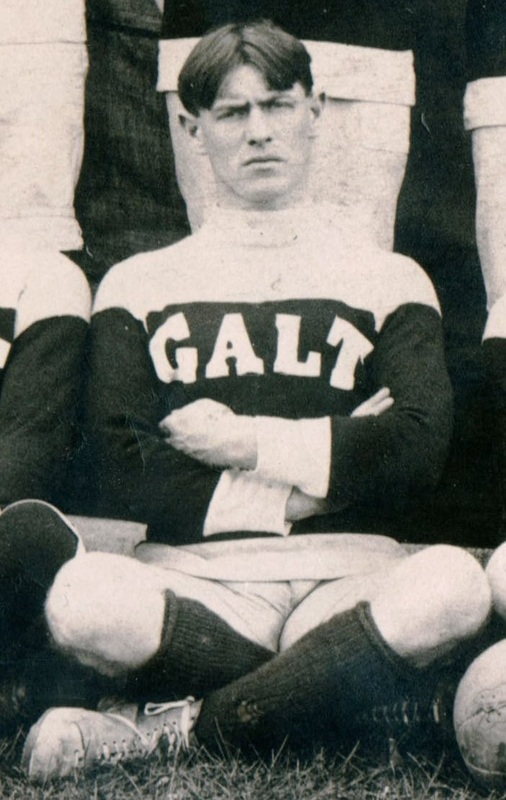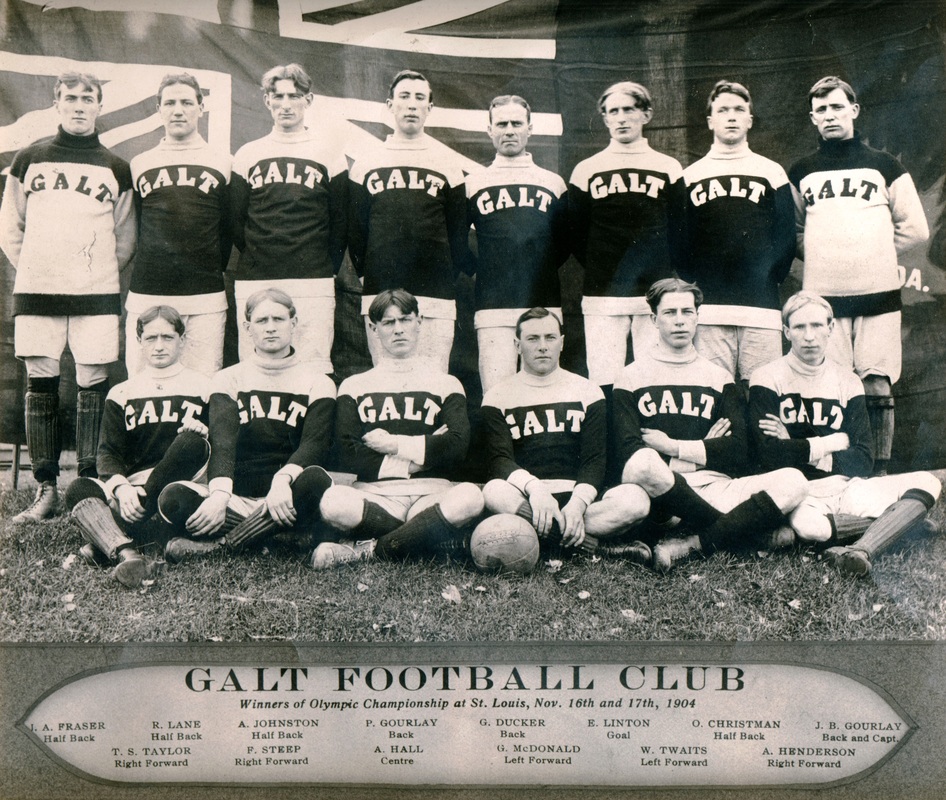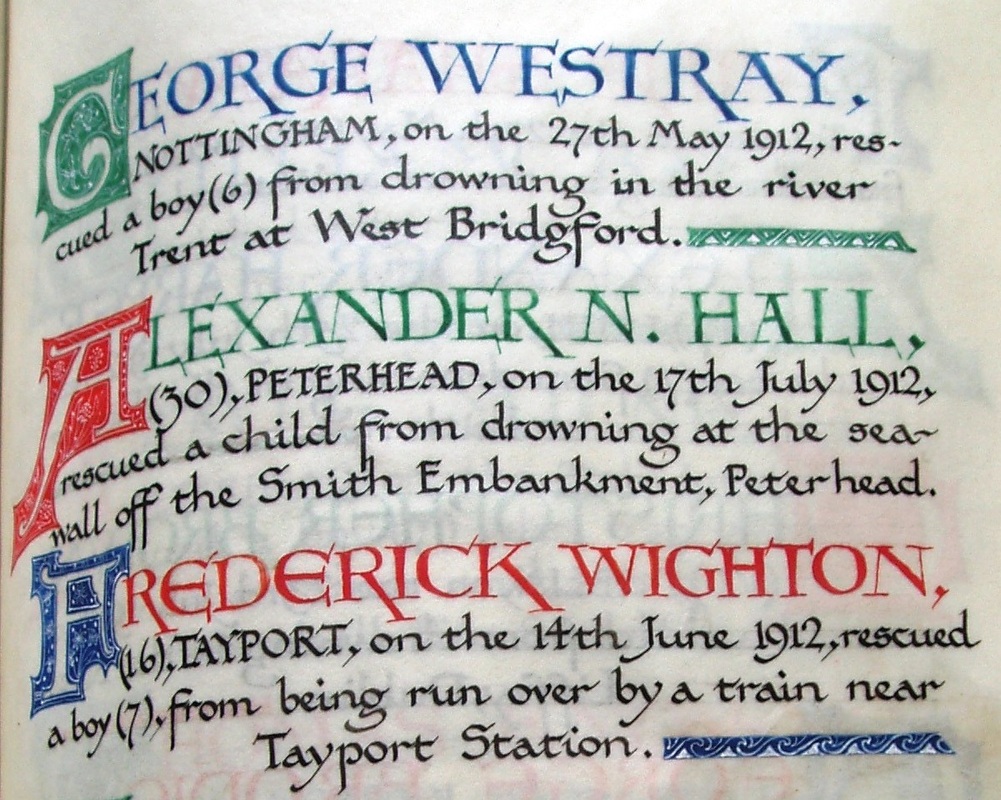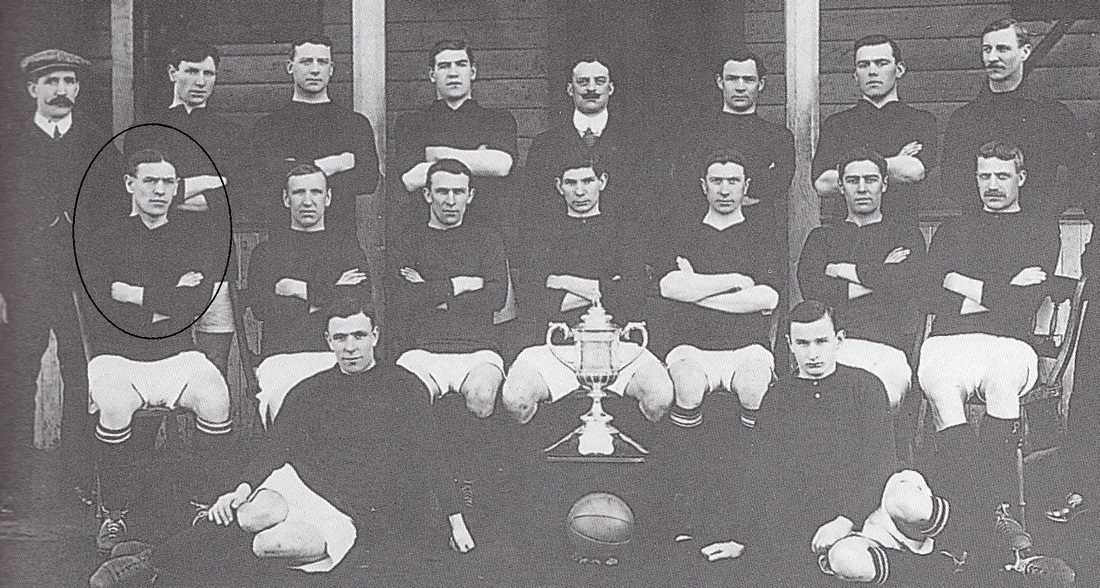The son of a whale fisherman, Alexander Noble Hall was brought up near Peterhead harbour but spurned the sea to earn his living by cutting granite. The hard physical work kept him fit and he played centre forward for his home town team, but there were few signs of the glory to come, an Aberdeenshire Cup final being a rare highlight.
That would all change when the young man travelled to Canada in 1901 in search of adventure, picking up work on construction projects. After a couple of years his stonecutting took him to Galt, west of Toronto, a small nondescript town which just happened to have the top football team in Ontario. With the added ingredient of Hall's goals, the Galt eleven would achieve an extraordinary triumph: Olympic gold.
The 1904 Olympiad in St Louis was the first where medals were awarded in association football, the winners recognised by the International Olympic Committee even though the competition was limited to just three teams from two countries. Galt defeated the University of Toronto for the right to represent Canada, then headed south to Missouri in exuberant fashion on the Grand Trunk Railway. They were backed by 50 supporters, including the town's mayor, who paid $10.70 each for the round trip on a special train decked in red and white.
Hall, the only non-Canadian in the eleven, scored a hat-trick in the opening match on 16 November, as Galt thrashed Christian Brothers College 7-0; the following day they defeated St Rose Parish 4-0. Without conceding a goal against these two local sides, the Galt players were duly declared Olympic football champions and trooped off to the Department of Physical Culture to be presented with gold medals. One of those precious prizes, won by fellow forward Fred Steep, is now on show at the Canadian Soccer Hall of Fame.
Yet when Hall returned home a year later, his Olympian status counted for little, and after a trial with Aberdeen reserves he picked up again for Peterhead in local amateur football. There the story might have ended but he was spotted by Edinburgh side St Bernard's, who liked his direct bustling style, and they offered him the chance to play professionally. He made a sensational start to his senior career at the age of 25, scoring a hat-trick against Dumbarton, and his goals in 1906/07 were a major factor in Saints winning the second division championship.
This scoring prowess brought him to the notice of bigger clubs, and there was none bigger than Newcastle United, who had just clinched the English first division title. They paid £200 to take him to Tyneside in 1907, and again he made an immediate impression with ten goals in three end-of-season tour games in Germany; but when it came to the rigours of the Football League he made little headway and played just six times, scoring twice. United were happy to sell him to Dundee before the season was out.
Again he made an early impact, netting a cup double against Aberdeen on his debut, but Hall was used only sparingly as cover for Dundee's established forward line, and had to be content with banging in the goals for the reserves. His chance to shine eventually came in the 1909-10 season with an extended run at centre forward, replacing first the ageing John 'Sailor' Hunter then George Langlands. Hall scored a hat-trick that saw off Motherwell in the Scottish Cup quarter-final; but after failing to find the net in the semi he was dropped for the final, cruelly missing out on Dundee's epic cup victory over Clyde. He played his part nonetheless, as a fixture backlog forced Dundee to play 12 games in April, and he turned out in several league matches to keep the stars fresh for the final. There was no medal for him, but Hall's role as understudy was acknowledged with a place in the cup-winning squad photo.
No sooner had the season ended than he was off to Portsmouth, where he was offered work as a stonecutter, but he failed to settle with just three goals as his team finished bottom of the Southern League. He returned to Scotland with Motherwell, ironically signed by their new manager John Hunter, who had taken Hall's place in Dundee's cup final team, but failed to find the net even once.
While playing success eluded him, Hall hit the headlines for a different reason in the summer of 1912 while visiting his mother in Peterhead. Hearing shouts that a boy was drowning, he ran down the harbour embankment, shed his clothes, and swam out against a strong current to save 5-year-old Alick McKenzie. Both the Carnegie Hero Fund and the Royal Humane Society recognised his bravery.
The war inadvertently revealed that his family life was quite a tangle. Hall and his partner Elizabeth Gibson had had three sons, but although each time they stated on the birth certificates that they were married, in fact they only tied the knot late in 1915, perhaps with the realisation that there would be dire financial consequences for her in the event of his death.
As it happened, he survived unscathed and after demob in 1919 was still fit enough to embark on a football swansong at home in Peterhead, coaching and playing well into his forties. However, while he won another winner's medal in the Aberdeenshire Charity Cup, the episode ended in farce in 1923 when most of his team refused to play Aberdeen in a Scottish Cup tie. They were upset at the club's decision to sell ground rights, and Hall led out a hastily-assembled makeshift eleven who suffered a record-breaking 13-0 thrashing at Pittodrie. It may have been a factor in his decision that summer to emigrate to Toronto with his family, this time for good.
As Sandy Hall faded into distant memory, his death in Canada in 1943 went almost unnoticed in Scotland, even in his native Aberdeenshire. Yet the first Scots-born Olympic gold medal winner retains a unique place in our sporting history, and deserves to be remembered as a local hero in the truest sense of the word.
Alexander Noble Hall
Born Aberdeen, 3 December 1880
Died Toronto, 25 September 1943
Football career
Peterhead 1898-1901
Buckie Thistle 1901
Toronto Scots 1902-03
Galt 1904
Westmount, Montreal 1905
Aberdeen A 1905
Peterhead 1905-06
St Bernard's 1906-07
Newcastle United 1907-08
Dundee 1908-10
Portsmouth 1910-11
Motherwell 1911-12
Dunfermline Athletic 1912-15
Peterhead 1920-23
Honours
Olympic gold medal 1904
Scottish Second Division Championship 1906-07
Lanarkshire Cup 1912
Fife Cup 1912, 1914
Aberdeenshire Charity Cup 1921
Carnegie Hero Fund award 1912
Royal Humane Society award 1912
Wartime service medals
Article copyright Andy Mitchell. With thanks to Les Jones, Colin Jose, Gordon Baird and the Andrew Carnegie Hero Fund Trust for their input.




 RSS Feed
RSS Feed